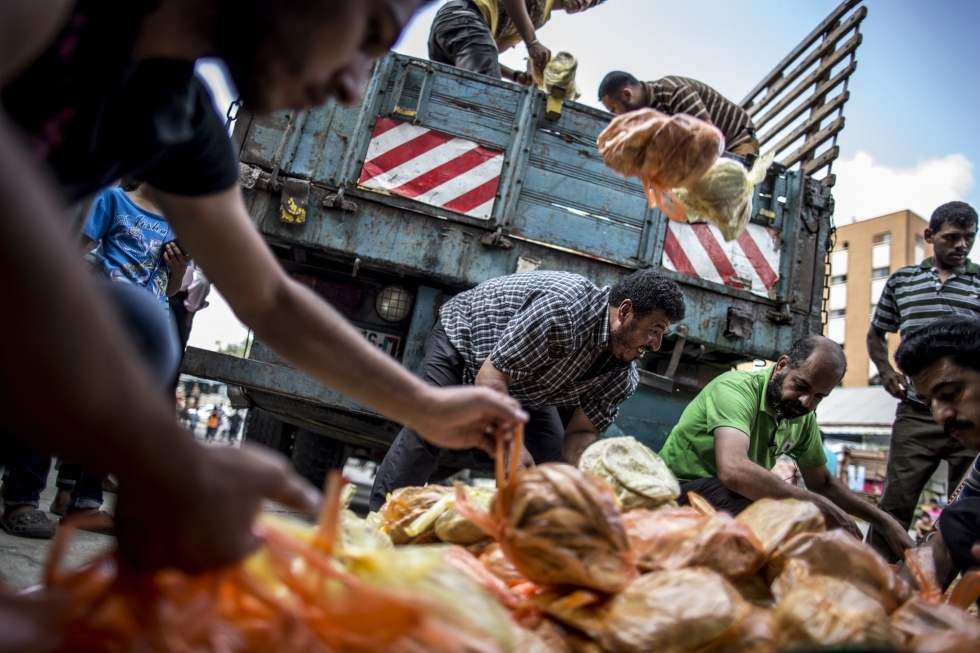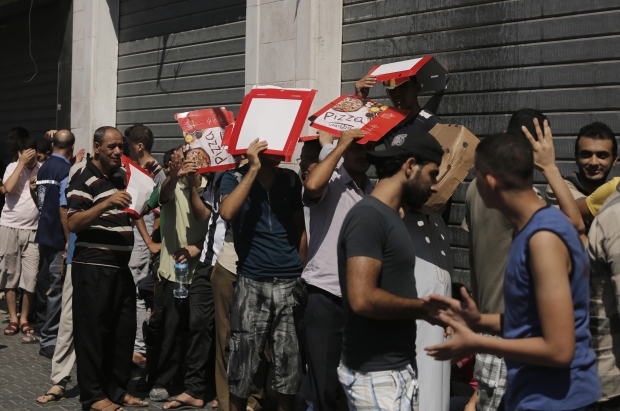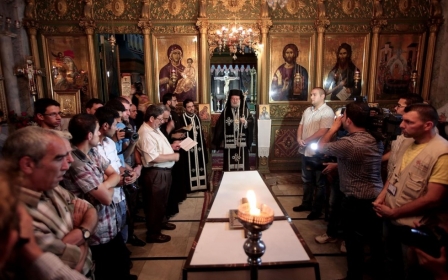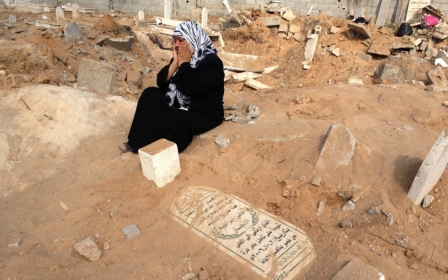Gaza’s bomb-hit bakers struggle to feed starving refugees

GAZA CITY - Under an unbearable sun, with drones and F16s hovering menacingly overhead, young men, women and small boys wait in a seemingly never-ending line at the two Tal Al Hawa Bakeries, in West Gaza City. Some men use pizza cartons to protect their heads from the sun.
“I have been waiting here half a day to get just one sack of bread,” says 26-year-old Mohammed Abu Shammalah.
He doesn’t only have to worry about keeping his 11 siblings alive amid the relentless Israeli air, naval and artillery strikes, but also how to bring home one of the most basic foods for any family - bread.
It is 6:30 PM, but he can’t go home empty-handed. “There is no food to eat at home, nothing” he says. Even vegetables are becoming expensive as farming land has also become inaccessible to farmers due to the constant bombing for more than 3 weeks.
Shammalah says the biggest problem for many is how the bombing of the electricity plant has forced most of Gaza’s bakeries to shut down. No power equals no fresh bread.
The United Nations Office for Humanitarian Affairs notes in a report published Thursday on food security in Gaza said: “The ongoing reduction of electricity supply will heavily impact the commercial activities, the milling capacity and the bakeries performance.”
The situation in Gaza is one of no supply to meet a huge demand. The owner of the bakery - Mohammed al-Jarwsha- is well aware of this as hundreds of anxious, hungry and hot customers wait outside his shop door.
Shammalah says that his mother might have been able to bake some bread, except that she has no electricity or cooking gas, like so many others in Gaza. Several suppliers of gas cylinders, in Gaza City, are not able to distribute what small supplies they have because of Israel’s present bombing and shelling.
Another factor contributing to the lack of gas is that most distributors are located in parts of eastern Gaza City which are presently inaccessible, following this week’s heavy Israeli bombardment.
Even the dough in his fridge has spoiled as it has no power. There is no doubt in his mind that this is collective punishment.
“This is meant to make us - the people - hate Hamas and turn against it. But the result is the opposite, the people have become closer to Hamas,” he said, as ambulances nearby try to rush through the crowds waiting for bread, shouting at people to let them through.
The lines continue to grow outside in the streets, as more people arrive wanting to buy bread. The process is slow, as all automatic machines are not in use due to the outages of power.
Umm Mohammed al-Madhoun, 53, has braved the bombings to get bread for her family. She can see the long line of desperate people ahead of her, but she must get some bread, at least, before she gets home.
“Israel’s only interest is to paralyze our lives in Gaza,” she says, as she tries to squeeze ahead in the line.
Jarwsha says he knows why Gaza is reeling under the attacks - those in the east part of the city have fled inward, escalating the public pressure in already-overcrowded areas such as Tal al Hawwa, al Nasser and Gaza City center. His small bakery can’t cope with the influx.
“The estimated number of inhabitants forced to flee Shejaiya and Zaytoun is over 180,000 people, arriving here by force, and we can’t keep up with the heavy demand and delivery service,” he said.
Jarwsha tells MEE that “he is no longer able to produce bread on full capacity” before being interrupted by a boy coming to say, “I am hungry and want some bread.”
Fifteen-year-old Majdi Al Ayoubi’s face is red and dusty from waiting in the sun - it’s difficult for his small body to squeeze through the crowds. He has been in line for hours, but now he says he is tired.
When Majdi told his mom he was hungry, his dad asked him to wait in the bakery queue.
“I have been waiting half a day, and I can’t wait any more, I am tired,” he says.
In relatively calm periods, prior to this three-week long Israeli attack, Jarwsha and his workers would spend day and night producing bread in order to meet the needs of their clients. Now, he knows he can’t necessarily work at night.
Night-time brings the heaviest Israeli bombing and he fears that this endangers the lives of his staff.
Even if trucks of flour did arrive, there is not much to be done when the electricity is out and there’s no cooking gas.
However, Al Madhoun says, “This is another dark period which will pass, as Palestinians are familiar with going through hard times.”
Middle East Eye propose une couverture et une analyse indépendantes et incomparables du Moyen-Orient, de l’Afrique du Nord et d’autres régions du monde. Pour en savoir plus sur la reprise de ce contenu et les frais qui s’appliquent, veuillez remplir ce formulaire [en anglais]. Pour en savoir plus sur MEE, cliquez ici [en anglais].





